Introduction
The legal profession is undergoing a significant transformation as digital marketing becomes an essential tool for attracting and retaining clients. With the rise of online advertising, lawyers face a complex landscape shaped by various regulations and ethical guidelines that govern their marketing practices. Understanding these rules is crucial for compliance and building a reputable brand.
This article delves into the intricacies of online advertising for legal professionals, examining proven digital marketing strategies, the importance of managing online reputation, and the metrics necessary for measuring campaign success. By navigating these aspects effectively, law firms can enhance their visibility, foster trust, and ultimately drive growth in a competitive market.
Understanding the Legal Landscape of Online Advertising for Lawyers
Navigating the intricacies of lawyer online advertising presents a significant challenge for legal professionals, primarily due to the varying regulations imposed by state laws and specific practice areas. For lawyers, adherence to the promotion rules established by the American Bar Association (ABA) and local bar associations is paramount when it comes to lawyer online advertising. These regulations include:
- Prohibitions against false or misleading statements
- Obligations to maintain confidentiality
- The necessity for substantiating any claims made in advertisements
Significantly, all ten laws encompass a right to contest the rejection of any consumer rights, which highlights the significance of transparency and accountability in legal communications. Compliance not only shields legal practitioners from potential disciplinary actions but also bolsters their credibility in the eyes of prospective clients. Recent statistics suggest that a notable 75% of lawyers allocate less than 10% of their promotional budget to social media; as quoted by AttorneyAtWork, ‘75% of lawyers say they spend less than 10 percent of their budget on social.’
This indicates a wider trend where 37% of law firms are now investing in LinkedIn promotion. Staying informed about updates to marketing laws is essential; for instance, Texas has implemented specific legal marketing regulations that align with local values and consumer protection objectives. These regulations help ensure that marketing practices reflect the unique legal landscape of the state, ultimately guiding lawyers in developing compliant and effective lawyer online advertising strategies.
By understanding these regulations, lawyers can enhance their practice’s reputation and reach.
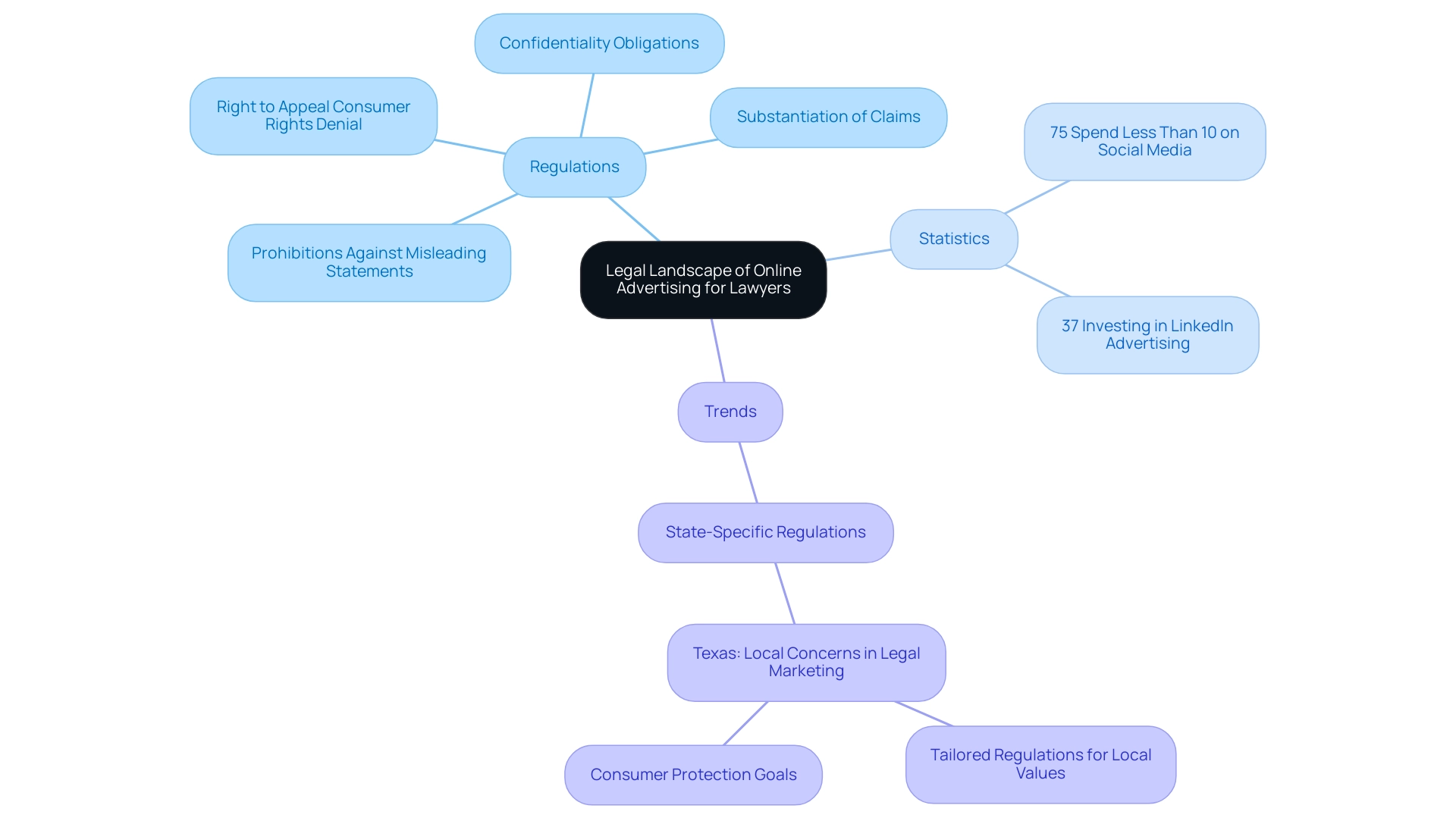
Proven Digital Marketing Strategies for Law Firms
To foster substantial online growth, law firms must implement a comprehensive digital marketing strategy that features lawyer online advertising. The following key approaches are essential:
- Search Engine Optimization (SEO): Prioritize the enhancement of your website for local search queries, which is crucial for visibility when potential customers seek legal services nearby.
Incorporate pertinent keywords into your content, meta tags, and headings to ensure search engines effectively index your site. As highlighted by recent insights, 50% of individuals searching locally for services like those provided by lawyers will visit an office within 24 hours, making local SEO a pivotal factor in client acquisition. According to ThinkWithGoogle, this statistic highlights the urgency for legal practices to enhance their online presence.
-
Pay-Per-Click (PPC) Advertising: Leverage PPC campaigns on platforms such as Google Ads to directly target specific demographics and keywords, thereby ensuring immediate exposure in search results. This strategy allows for rapid visibility and can complement your organic search efforts.
-
Content Marketing: Develop informative blog posts, articles, and resources that address prevalent legal questions and concerns.
This not only positions your company as an authority in the field but also enhances your SEO initiatives by generating valuable content that attracts potential clients.
- Social Media Marketing: Actively interact with potential customers through social media platforms by sharing insights, legal updates, and relevant content. This method creates a community centered on your practice, nurturing trust and promoting interaction with customers.
These tactics together enhance a legal practice’s online presence and greatly boost customer acquisition efforts with lawyer online advertising. As legal practices increasingly allocate their marketing budgets towards online channels—65% prioritizing digital marketing and 36% reporting an increase in their average marketing budget, as shown in the case study titled ‘Legal Marketing Budget Allocation’—adopting these practices is essential for staying competitive in 2024 and beyond.
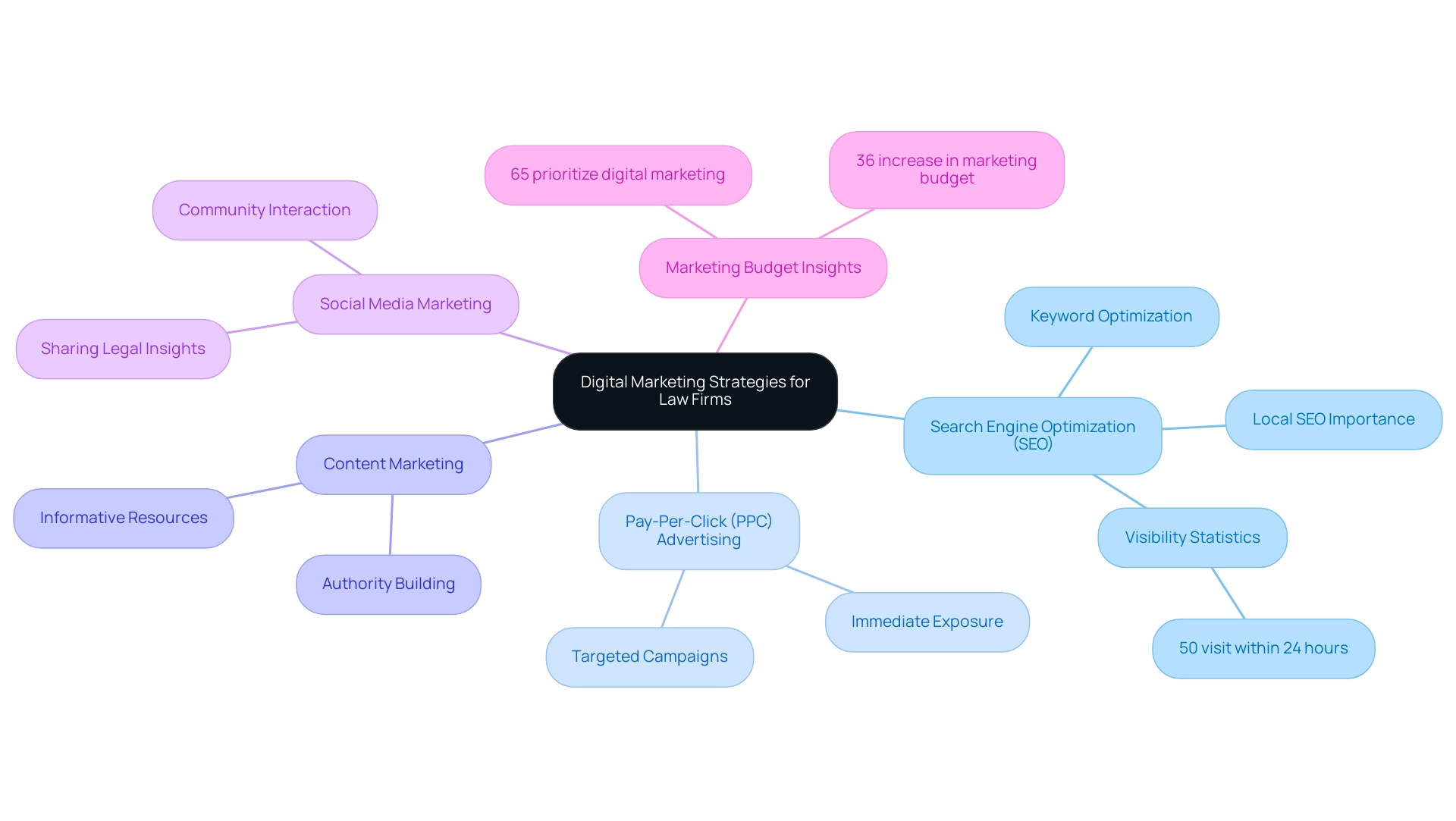
Managing Your Online Reputation: The Key to Client Trust
A strong online reputation is essential for legal practices that utilize lawyer online advertising to attract and retain customers. It begins with consistently monitoring online reviews across platforms such as Google My Business, Yelp, and Avvo. Prompt replies to both positive and negative feedback not only show a dedication to satisfaction but also build trust—an essential component in customer acquisition.
According to the American Bar Association (ABA), 63% of individuals stated they would probably recommend a friend or associate to a legal practice that actively addresses feedback and communicates subsequent changes. Moreover, motivating pleased customers to leave feedback can act as strong social proof, greatly influencing prospective customers’ choices. However, it is essential to acknowledge that unfavorable reviews can cause lasting harm, diminishing trust and dissuading potential customers.
To manage reputation proactively, legal practices should consider implementing strategies that involve creating positive content, such as success stories and testimonials from customers. This approach not only builds credibility but also plays a crucial role in mitigating the effects of negative reviews. Numerous case studies have underscored the correlation between positive online feedback and increased trust, revealing that high ratings lead to greater customer engagement and satisfaction.
For instance, companies that actively manage their online feedback often experience a marked improvement in client relationships and overall reputation. Conversely, negative reviews can lead to reputational crises, highlighting the necessity for lawyers to actively manage their lawyer online advertising and feedback. By leveraging analytics tools like Google Analytics, SEMrush, and HubSpot, firms can refine their strategies, enhance visibility, and stay ahead of industry trends.
These tools provide insights into website traffic, keyword performance, and marketing ROI, crucial for fostering a robust online presence and effectively managing online reputation.
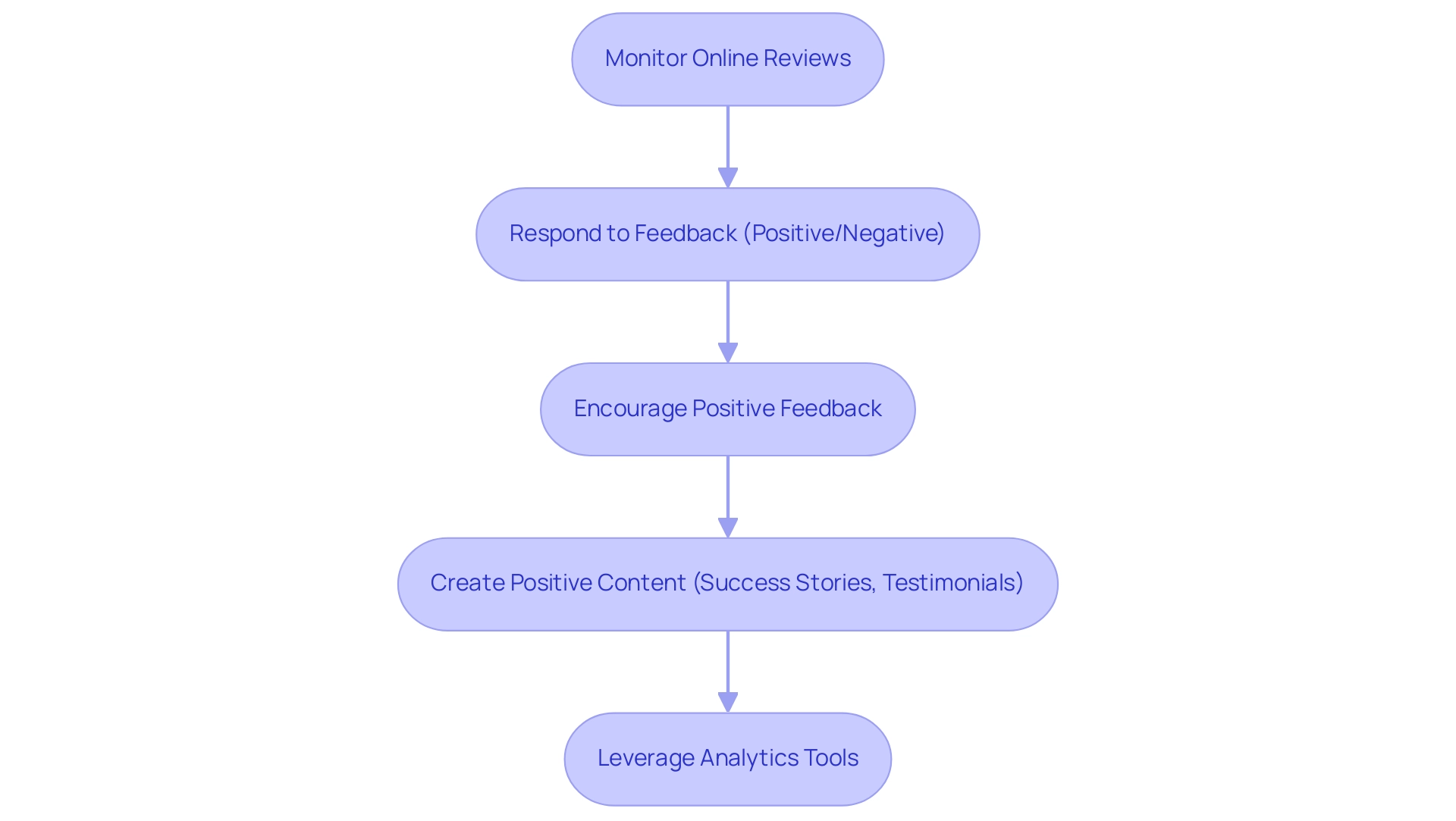
Navigating Ethical Guidelines in Lawyer Advertising
Lawyer promotions are subject to stringent ethical guidelines that mandate transparency and honesty. It is essential for legal professionals to familiarize themselves with the American Bar Association (ABA) Model Rules of Professional Conduct, particularly Rule 7, which outlines acceptable promotional practices. For example, advertisements must not mislead potential clients and must accurately convey the lawyer’s qualifications and experience.
Furthermore, it is critical to refrain from making unverifiable claims regarding case outcomes, as such statements can undermine trust and compliance. According to recent statistics, approximately 75% of lawyers believe that following ethical promotion guidelines enhances their reputation. To effectively navigate these guidelines, legal practitioners should:
- Consult their state bar association for specific regulations.
- Consider requesting an ethics review of their advertising materials prior to campaign launches.
This proactive strategy not only protects your practice from potential ethical breaches but also enhances your professional reputation in an increasingly competitive legal landscape. As highlighted in the case study titled ‘Guidelines for Ethical Advertising,’ following the ABA guidelines can lead to improved client trust and satisfaction. Additionally, Conroy Creative Counsel offers strategic digital marketing and expertise in lawyer online advertising compliance, helping law practices thrive while adhering to ethical standards.
As noted by Karin Conroy, founder of Conroy Creative Counsel, mastering smart, sophisticated, and strategic marketing is vital for legal practices to thrive. Adhering to established ethical standards positions your organization as a trustworthy advocate in the eyes of potential clients.
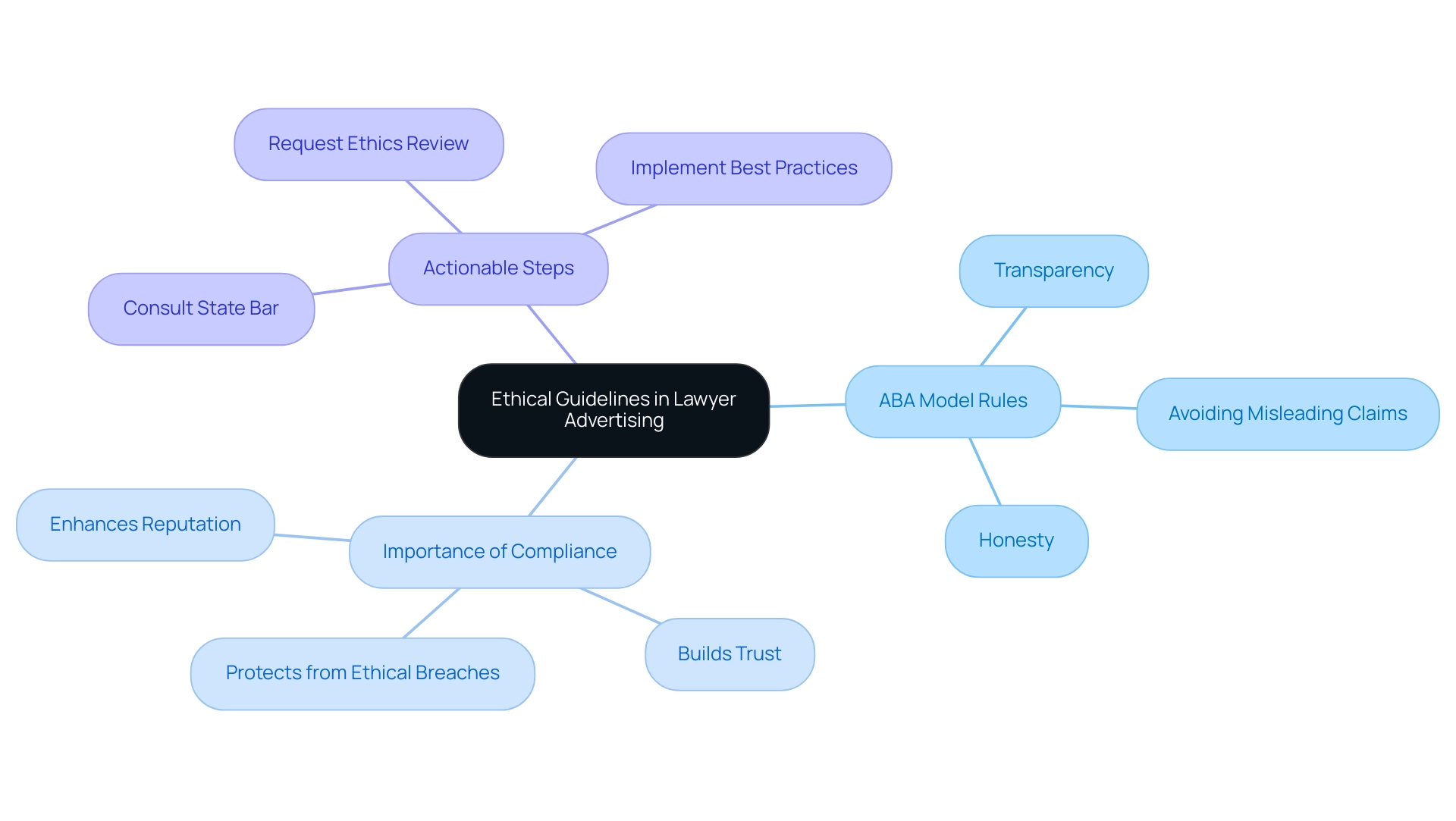
Measuring Success: Analyzing Your Advertising Campaigns
Establishing clear metrics for assessing the success of your marketing campaigns is crucial for optimizing performance. Key performance indicators (KPIs) for promotion through lawyer online advertising encompass several essential metrics:
-
Click-Through Rates (CTR): This measures the percentage of users who click on your ads compared to those who view them.
For instance, Instagram ads in the feed exhibit a CTR of only 0.22%, while Stories present a marginally higher benchmark of 0.33%, indicating the need for strategic ad placement. Significantly, as Dave Chaffey mentions, ‘Regrettably, there isn’t a breakdown by social network in the Skai data, but the majority of the spend is with Meta platforms Facebook and Instagram,’ highlighting the significance of these platforms in promotional strategies. -
Conversion Rates: This metric tracks the number of leads that convert into clients after engaging with your website or advertisements.
-
Cost-Per-Lead (CPL): Evaluating the cost-effectiveness of your campaigns entails calculating the total expenditure divided by the number of leads generated.
Recent case studies show that while sectors such as Arts and Entertainment experienced a -41.73% enhancement in CPL, legal practices must stay alert as promotional expenses vary—demonstrated by the overall CPL of $66.69 across different industries. For comparison, Physicians and Surgeons experienced a 58.42% increase in CPL, highlighting the diverse challenges across industries. Furthermore, it’s significant that 37% of legal practices are investing in LinkedIn promotions, highlighting current trends in resource distribution. -
Return on Investment (ROI): This assesses the overall profitability of your campaigns by comparing the revenue generated from clients acquired through advertising to the costs incurred.
Regularly reviewing these metrics allows law firms to identify successful strategies and areas for improvement in their lawyer online advertising, facilitating data-driven adjustments that enhance the effectiveness of their campaigns.
Notably, as 70.7% of lawyers respond to potential leads within an hour, timely follow-up also plays a critical role in maximizing conversion opportunities.
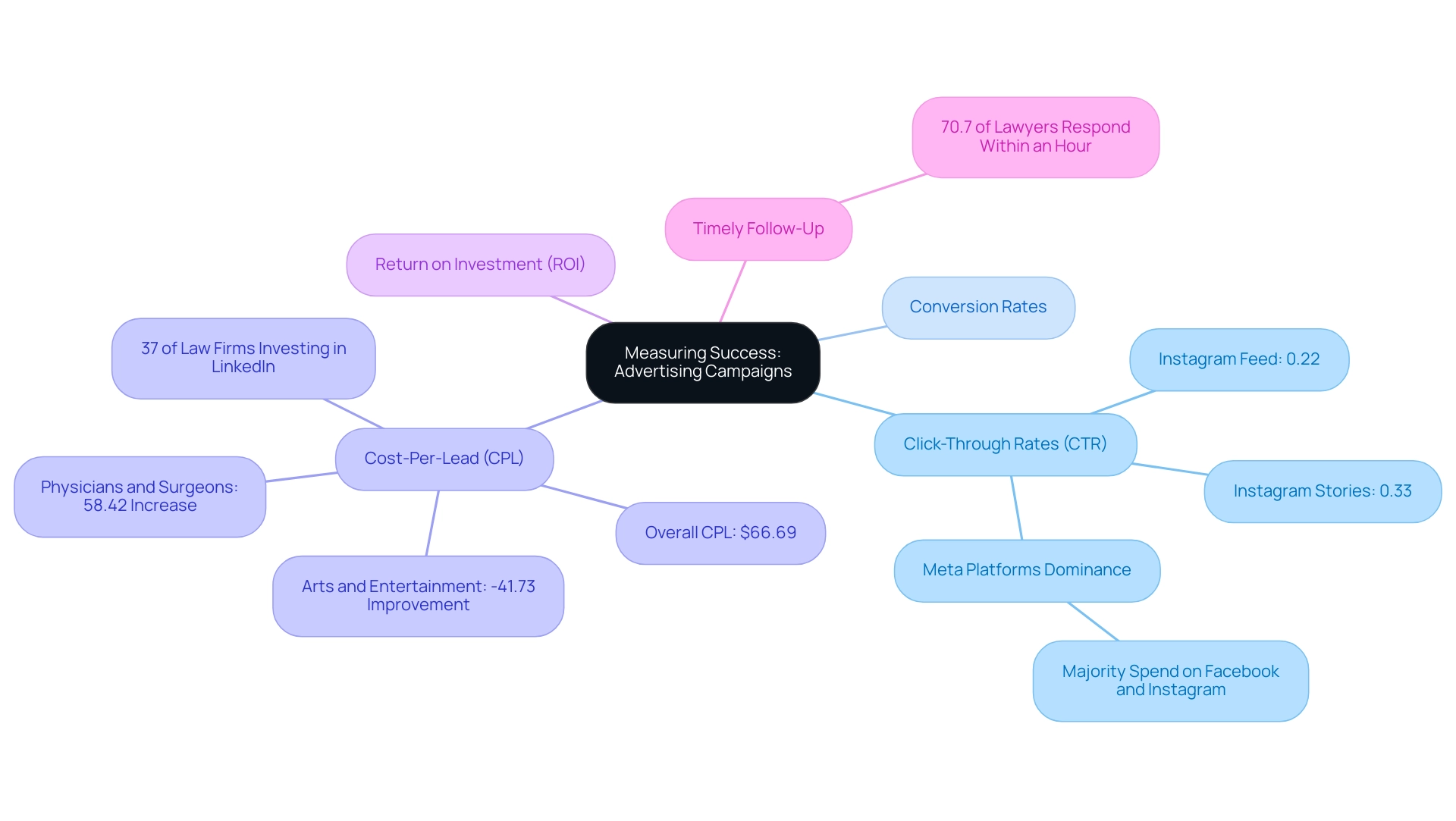
Conclusion
Navigating the complexities of online advertising is essential for legal professionals aiming to build a strong and reputable brand. This article has explored the critical components of digital marketing strategies, emphasizing the importance of understanding legal regulations and ethical guidelines. By adhering to the standards set forth by the American Bar Association and local bar associations, lawyers can not only avoid potential pitfalls but also enhance their credibility and trustworthiness in the eyes of prospective clients.
Implementing proven digital marketing strategies such as:
- SEO
- PPC advertising
- Content marketing
- Social media engagement
is vital for law firms looking to improve their online presence. These tactics not only facilitate client acquisition but also foster a sense of community and trust. Furthermore, managing online reputation through proactive engagement with client feedback and leveraging analytics tools can significantly bolster a firm’s standing in a competitive market.
Ultimately, measuring the success of advertising campaigns through key performance indicators ensures that law firms can make data-driven decisions that optimize their marketing efforts. By continuously refining their strategies and adhering to ethical advertising practices, legal professionals can thrive in an evolving digital landscape, attract more clients, and establish themselves as trusted advocates within their communities. The commitment to ethical marketing, combined with innovative digital strategies, is a powerful formula for sustained growth and success in the legal field.

